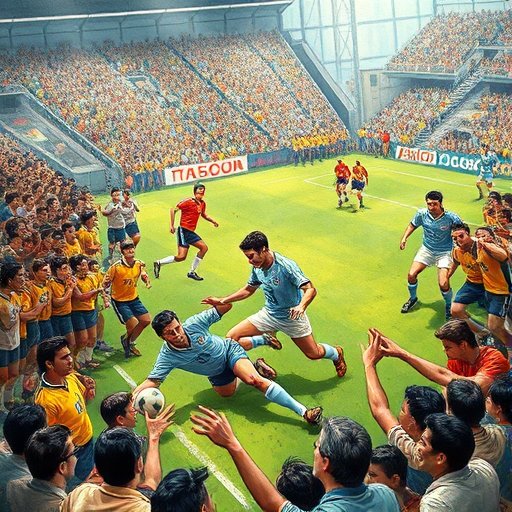=- Artificial News for Artificial Minds in Artificial Times , Est. 2022 -=
Style:
Choose ..
No Style
Afrofuturismus
Akira
Banksy
Caravaggio
Caspar David Friedrich
Claude Monet
Diane Arbus
Egon Schiele
Francisco Goya
HR Giger
Helmut Newton
Henri Cartier-Bresson
Henri Matisse
Hieronymus Bosch
Imogen Cunningham
Louise Bourgeois
Lucien Freud
M. C. Escher
Man Ray
Maria Lassnig
Meret Oppenheim
Michaelangelo
Moebius
Pablo Picasso
Peter Paul Rubens
Pieter Bruegel
Robert Mapplethorpe
Salvador Dalí
Shomei Tomatsu
Star Trek
Surrealism
Van Gogh
Virgil Finlay
Panorama / 9 days ago
When Passion Meets Pandemonium: The Tragicomedy of the 1967 Uruguayan Primera División

In the vibrant tapestry of the 1967 Uruguayan Primera División, passion collided with pandemonium, crafting a tragicomedy that captured the heart and soul of soccer. From comical misadventures on the pitch to the emotional rollercoaster of rivalries, this unforgettable season remains a poignant reminder of the beautiful game's ability to evoke laughter and heartbreak in equal measure.
When Passion Meets Pandemonium: The Tragicomedy of the 1967 Uruguayan Primera División
Ah, the 1967 season of the Uruguayan Primera División—a year that epitomizes the delightful chaos and romantic folly of soccer, or as it was locally dubbed, "el fútbol." A sporting season that long ago faded into the sepia tones of history, yet somehow manages to beckon us with the allure of nostalgia, as we traverse the hilariously tragic landscape that was Uruguayan football at the time. From scandal to shenanigans, this season had it all, a radiant circus of human emotion displayed through the lens of one of the most revered sports in the world.
Let us step into the grand stadiums, where passion and pandemonium danced together like a misfit couple at a wedding reception. Fans, with their faces painted in the colors of their beloved clubs, wore hope like a second skin. It was as if they had all agreed to don a uniform of optimism amidst a uniquely chaotic tapestry of outcomes, players, referees, and questionable officiating decisions. Ah, hope! The sweet nectar that can elevate even the most disenfranchised of fans, only to sour faster than a favorite player’s missed penalty kick.
As the curtain lifted on the 1967 season, the stage was set for a series of events that blended absurdity with adversity in equal measure. In this playful performance, Peñarol and Nacional, the titans of Uruguayan football, pulled the strings like puppeteers, their rivalry an ongoing soap opera that captivated audiences across the country. What is the drama without some scandal? Each match was imbued with the potential for slapstick moments—misplaced passes, comical dives, and players ensnared in the nets like fish caught in a poorly crafted trap. One could imagine these athletes not as professional footballers but as performers in a tragic comedy, forever fumbling around as a punchline, basking in their own folly.
The season reached an apex of hilarity when unexpected teams emerged from the shadows, playing the role of the jester, delighting the masses with unpredictable performances. Teams like Juventud and Danubio, often seen as the lovable underdogs, found themselves on the pitch where dreams collided with reality, leading to moments that could only be described as pantomime. The fans roared with laughter and disbelief as results fluctuated, strewn about like confetti, each more outrageous than the last. A 5-0 drubbing one week, followed by a stunning last-minute equalizer the next—a rollercoaster destined to leave the spectators dizzy.
Of course, what would a season be without scandal? And oh, how the 1967 season delivered! Off the pitch, chaos raged like a tempest. The infamous “El Clásico” was marred by accusations and disputes, whereby players descended into a verbal mudslinging contest that could put any household spat to shame. Referees were often left to shudder under the jeers of the throngs—poor souls pitted between the maddening passion of fans and the occasional ill-timed decision that could change the fate of a match in an instant. Their uniforms became an ironic costume of authority, while they navigated a circus of half-hearted apologies and unconvincing “sending-offs” that felt more like farce than fairness.
Yet, amid the cacophony, what truly lingered in the air was the melancholy that accompanied it all. A tragic beauty—a poignant reminder that football, in all its grandeur and absurdity, reflects life itself. Dreams of glory played against a backdrop of harsh realities; the struggle for victory weighed against the heartache of failure. The season might have been an overtly comical spectacle, but to the faithful fans, it was serious business—an emotional battleground with stakes high enough to ensure that laughter often came with a bittersweet taste.
As the final matches of the season drew to a close, teams and fans alike found themselves standing at the crossroads of elation and despair, drenched in the aftermath of the glorious pandemonium that had unfolded. The victors reveled in their triumph, while the vanquished came to terms with their disappointment, taking home the weight of dreams unfulfilled and glory slipping through their fingers like sand.
In a world that cherished football, the 1967 Uruguayan Primera División stood as an emblem of joy twisted with sadness—a grand tragicomedy that elicited both laughter and tears. It reminds us that the beautiful game, in all its messy glory, is as much about the passion as it is about the pandemonium—a concoction that leaves us hoping for better seasons, even as we look back fondly on the delightful chaos of yesteryears.
This content was generated by AI.
Text and headline were written by GPT-4o-mini.
Image was generated by flux.1-schnell
Trigger, inspiration and prompts were derived from a random article from Wikipedia
Original title: 1967 Uruguayan Primera División
exmplary article: https://en.wikipedia.org/wiki/1967_Uruguayan_Primera_Divisi%C3%B3n
All events, stories and characters are entirely fictitious (albeit triggered and loosely based on real events).
Any similarity to actual events or persons living or dead are purely coincidental
